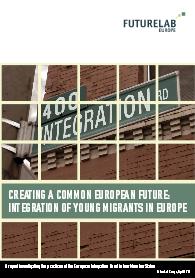Creating a Common European Future: Integration of Young Migrants in Europe, A report investigating the practices of the European Integration Fund in four Member States, FutureLab Europe, Απρίλιος 2015.
EXECUTIVE SUMMARY:
The main purpose of this report is to assess the integration of migrants in the EU by investigating the practice of the European Integration Fund (EIF) in four EU member states: Finland, Germany, Romania, and Spain, virtually covering Northern, Continental, Eastern and Southern Europe.
The study is the result of a qualitative research based on the findings that emerged from 10 interviews with NGOs based in the case study countries and co-financed by the EIF, and a questionnaire filled out by 125 migrants who took part in EIF-funded programmes. The aforementioned methodology was chosen to create a bridge between the people on the ground and EU policy makers, giving a voice to the people directly involved in EU-funded programmes as well as to the migrants themselves.
The questionnaire highlighted that a large number of migrants experienced discrimination in all the case study countries. Migrants put a very high emphasis on language, stressing that it is the most important factor for integration and called for a higher involvement of local NGOs and host societies to promote successful integration. In general, the programmes benefited from good communication: in the four focus countries, over two-thirds of the respondents thought that the EIF-funded programmes they took part in were easily accessible and over half of them knew that the programme was funded by the EU. NGOs generally lamented the lengthy and complicated bureaucratic proceduresdraining their already limited resources. They called for less stringent eligibility criteria for EIF-funded programmes so that they could include different types of migrants, including those without a regular resident permit, or foreign-born spouses or children who hold the citizenship of the host country and are therefore excluded from integration programmes.
On the basis of these findings, FutureLab Europe participants developed a number of policy recommendations to the EU, national and regional authorities and NGOs. The recommendations include:
To the EU:
- Strengthen the integration dimension of EU migration policy;
- Accompany integration measures with cooperation with third countries;
- Lessen the bureaucratic burden and make procedures more flexible;
- Create EU-wide projects fostering EU identity;
- Offer guidelines for the implementation of projects and favour
language classes, schools and leisure activities;
- Reinforce the youth dimension.
To national and regional authorities:
- Expand the criteria for beneficiaries allowing migrants without residence permits and foreign-born spouses and children to participate in the programmes;
- Promote the involvement of the host society in integration efforts to bridge the gap between migrants and EU citizens.
To NGOs:
- Organise more culture and art projects to promote integration in a friendly setting;
- Involve migrants as project leaders to take advantage of their understanding of the culture of the country of origin and the host country in question;
- Exchange best practices with other NGOs to maximise efficiency.
Σχετικές αναρτήσεις:
- Gropas, R. & Triandafyllidou, A. (2015) Survey Report: Emigrating in times of crisis. Highlights and new data from an e-survey on high-skilled emigrants from Southern Europe and Ireland, Global Governance Programme – European University Institute, Φεβρουάριος.
- Seumas Milne, “Europe’s sea of death for migrants is a result of war and escalating inequality“, The Guardian, Thursday 9 October 2014.
- Zaiceva, Anzelika, Zimmermann, Klaus F., (2012), ‘Returning Home at Times of Trouble? Return Migration of EU Enlargement Migrants during the Crisis’, IZA Discussion Paper, N.7111.




